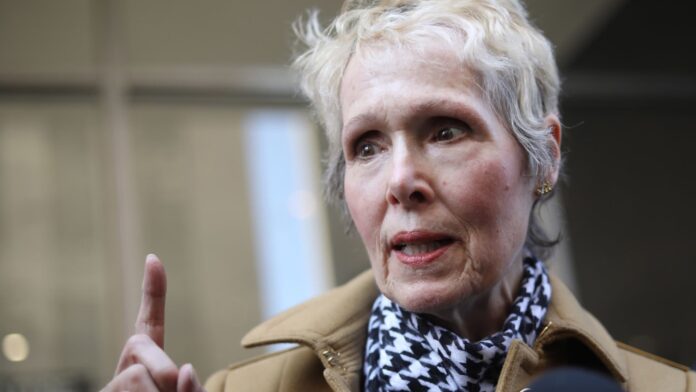E. Jean Carroll is seen outside State Supreme Court on March 4, 2020, in New York. Caroll is suing Donald Trump for defamation.
Alec Tabak for New York Daily News | Getty Images
A New York federal judge on Monday ordered the unsealing of nearly three dozen pages of a deposition from former President Donald Trump in a lawsuit accusing him of battery and of defaming a writer who says he raped her in the mid-1990s.
But the unsealed pages of Trump’s deposition were not immediately available in U.S. District Court in Manhattan.
And Trump’s attorneys later Monday filed a letter with Judge Lewis Kaplan asking for three days to oppose the unsealing of the section of the deposition. Kaplan has yet to rule on that request.
The writer E. Jean Carroll claims Trump defamed her when he denied her allegation in 2019 that he raped her in a dressing room in the Bergdorf Goodman department store in Manhattan in the 1990s.
Trump, while president, had said Carroll was lying and was motivated by a political agenda and a desire to promote sales of a book in making her claims.
Carroll originally sued Trump for defamation in late 2019 in New York state court. But the civil case was transferred to federal court a year later as part of an effort by the Justice Department to replace Trump as the defendant with the U.S. government.
In October, she filed a second lawsuit, after he wrote a scathing Oct. 12 social media post about her rape claim, which Carroll said constituted another act of defamation.
That new suit also added a count of battery, which Carroll was allowed to claim with the recent enactment of New York’s Adult Survivors Act, which opened a one-year window for adults to file civil claims of sexual assault even if those allegations fall outside of the normal statute of limitations.
In a court filing in December, Carroll’s attorneys attached more than 30 pages of a deposition they conducted of Trump on Oct. 19 over the course of about five-and-a-half hours at his Mar-a-Lago club residence in Palm Beach, Fla.
All of the questions they posed and the answers he gave in that deposition — which was conducted as part of Carroll’s first defamation lawsuit — were blacked out in a publicly available copy of the filing.
In his order Monday, Judge Kaplan wrote that Carroll’s lawyers had notified Trump’s attorneys on Dec. 19 that they were obliged by the practice of his judicial chambers to file within three days a letter explaining the need to seal or redact portions of Trump’s deposition.
Kaplan added that Trump, through his attorneys, “did not do so, and has made no effort to justify the continued sealing of his deposition.”
The judge then ordered the court clerk to unseal all of the portions of Trump’s deposition that were attached as an exhibit to Carroll’s filing in December.
Shortly after Kaplan’s order appeared on the public court docket, a letter from Trump’s lawyer Michael Madaio to the judge appeared there.
Madaio asked Kaplan for three days to file another letter opposing the unsealing of excerpts of Trump’s deposition.
Madaio wrote that after Kaplan issued an order last month in the case, he had believed that the burden was on Carroll’s lawyers to explain why unsealing the deposition transcript was necessary.
Lawyers for Trump and Carroll did not immediately respond to requests for comment Monday.
The trial for Carroll’s first defamation lawsuit has been scheduled for April 10. It is not yet known if the second lawsuit will be handled as part of that trial, or separately.
The federal appeals court in Washington, D.C., is considering the question of whether the allegedly defamatory statements Trump made about Carroll when he was president were within the scope of his role at the White House at the time, as defined by local District of Columbia law. Justice Department attorneys have previously argued that answering media questions was part of his job as president and, therefore, exempt from defamation claims.
If the appeals court rules those statements were within the scope of Trump’s employment, it could end Carroll’s first lawsuit, absent a Supreme Court ruling in her favor.
But that would not affect her first lawsuit, which covers statements Trump made well after he left the White House.


